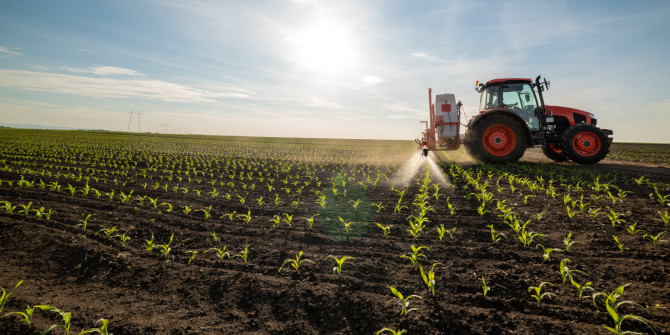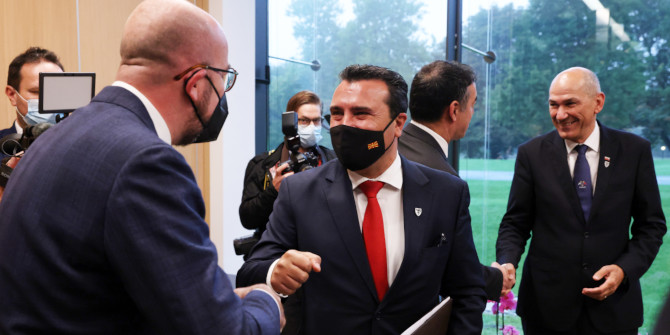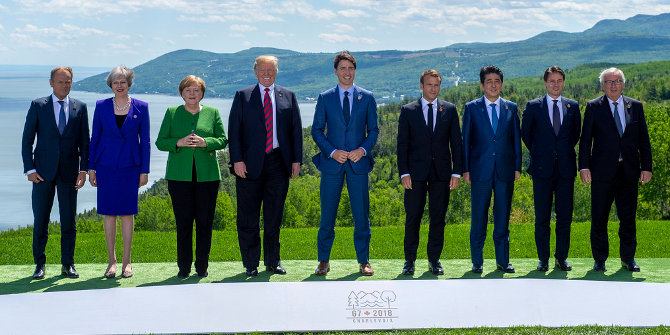Lithuania was one of ten states that joined the European Union on 1 May 2004. To mark the 20th anniversary of Lithuania’s accession, Ramūnas Vilpišauskas examines Lithuania’s impact on European integration and how two decades of EU membership have shaped the country.
Public discussions in Lithuania about its 20 years of EU membership usually focus on its impressive rate of economic convergence, its post-accession integration into the Schengen area, the Eurozone and regional energy market, as well as relatively high public support for the country’s membership. Lithuania has also been performing relatively well in terms of compliance with EU law and the functioning of its democratic institutions more generally.
What is particularly interesting in Lithuania is the relatively high share of the population that expresses support for the country’s membership of the EU and holds a positive image of the EU. For example, in the recent Eurobarometer survey, as many as 91% of respondents from Lithuania indicated that on balance their country benefited from EU membership (compared to 71% for the EU27 average). There is also a strong consensus among political elites regarding membership of the EU (and NATO), well expressed by Prime Minister Ingrida Šimonytė, who has described it as “the most successful political and economic decision” that framed the long-term development of modern Lithuania and allowed the country to achieve “many victories”.
Growing prosperity
What explains this strong popular support and political consensus regarding EU membership? First, despite several crises that affected Lithuania’s small and open economy, in particular the steep economic decline in 2008-2009, the country’s economic convergence has been among the fastest in the EU.
Lithuania’s GDP per capita increased from around 50% of the EU average when it joined, to close to 90% in 2022 (in purchasing power parity). This increase in general prosperity is often associated with the benefits of the EU common market and investments via structural funding, which became particularly important during crises.
According to popular opinion surveys, free movement of people is particularly valued by the Lithuanian population as a benefit of EU membership. Initially, accession led to significant rates of emigration, in particular during the economic crisis. Lithuanian citizens left for EU countries like the UK and Ireland, which did not apply transition periods for employment of citizens from the ten countries that joined the EU in 2004.
This outflow of people was probably the most controversial topic related to EU membership as it was seen as contributing to a deteriorating demographic situation. However, in recent years, migration patterns started to change and an increasing number of emigrants started to return to Lithuania – another sign of growing prosperity.
Managing crises
The importance of EU membership in managing external crises should be additionally stressed as a benefit that was not foreseen and remains somewhat underappreciated. Access to the common market was important for the country’s companies in reorienting their trade at the time of the global financial crisis. It also helped ease the impact of import restrictions on agricultural and food exports imposed by Russia in 2015 and allowed Lithuania to maintain trade in industrial products during COVID-19 lockdowns.
EU structural funding partly replaced national funding in areas such as research and science, allowing Lithuania to reduce fiscal tensions in the aftermath of the global financial crisis. Membership of the Eurozone, which Lithuania joined in 2015, helped the country to establish relatively sound public finances while also reducing the risk premium. This provided more fiscal flexibility for the government to allocate support for businesses and employers during the lockdowns in 2020 and to support households during the energy crisis in 2022.
Similarly, the geopolitical importance of EU membership has often been stressed by political elites in Lithuania (and other Baltic States). NATO and the presence of the US in Europe is seen as being particularly important from the point of view of the country’s security.
At the same time, membership of the EU (and the Eurozone) is seen as an additional safeguard against external threats from authoritarian countries such as Russia and Belarus. Lithuanian policy-makers and diplomats have been very active in advocating the EU’s support for reforms in its eastern neighbours, for Ukraine in its defence against aggression from Russia and for sanctioning those who violate international norms.
Lithuania’s contribution to EU decision-making
Initially after its accession in 2004, Lithuania focused mostly on the so called “left-overs” – joining the Schengen area and the Eurozone. Efforts to complete the country’s integration into the common market, in particular in the field of energy to reduce its former dependence on supplies from Russia, allowed the Lithuanian government to declare in the aftermath of Russia’s full-scale invasion of Ukraine in 2022 that it was completely stopping purchases of energy resources from Russia.
Support for the EU’s eastern partners in their reforms and their integration into the EU as well as for EU enlargement in general has been another consistent priority for successive Lithuanian governments. This was also the priority of Lithuania’s EU Council presidency in 2013. The Council presidency was also used as an opportunity to show that Lithuania can act as a reliable broker of agreements among EU member states.
In the debates on the future of the EU and related institutional reforms, Lithuania’s policymakers and diplomats have been part of the coalition of countries supportive of the status quo and opposed to reforms that require EU Treaty change. This position might become increasingly challenging to maintain as the debate on how the EU should prepare its institutions, policies and budget for future enlargement accelerates.
Strong support for EU enlargement, in particular the integration of Ukraine, will also accelerate the overdue national debate on how the country should maintain its economic growth as funding from the EU budget decreases (partly due to the impressive past rates of convergence). This will be one of the tasks for the President and the new government that will be formed after elections scheduled for 2024. They will also face a difficult task to continue Lithuania’s strategic partnership with Poland in maintaining the momentum of the EU enlargement process in the face of protests from Polish farmers and other interest groups directing their anger at competition from Ukraine.
Another important challenge stems from political polarisation in the US and its potential withdrawal from its role as a security provider for European NATO members, especially if Donald Trump returns to the White House in the 2024 US presidential elections.
Lithuania is traditionally a strong supporter of transatlanticism and has been cautious about the EU’s strategic autonomy, viewing the latter as an unwelcome alternative to NATO. However, in recent years the country has started to advocate for more defence spending and a stronger role for the EU as an argument for maintaining the presence of the US in Europe and its support for Ukraine. In this respect, the planned stationing of a brigade from Germany in Lithuania will increase the importance of cooperation.
Future challenges
Lithuania’s 20 years of EU membership have brought tangible economic benefits, a consolidation of democratic institutions and a feeling of being part of Europe. During the first decade of membership, Lithuania was often seen by others as “a single issue” country preoccupied with the threat posed by Russia. Russia’s increasingly aggressive behaviour, especially its war against Ukraine, was interpreted by the country’s political elites as vindication of this perspective.
The rise of authoritarian China and the economic dependencies of EU member states are now seen as another potential risk factor in the world given the growing rivalry between western democracies and authoritarian states. The decision of the Lithuanian government in 2021 to welcome a Taiwanese Representative Office in Vilnius and the following coercive response by China towards Lithuania holds important lessons for both Lithuanian political elites and other EU member states about the risks and benefits of exercising leadership in an interdependent world. Therefore, forging a coordinated EU response to the threats from authoritarian states as well as to domestic polarisation in the United States and its growing unilateralism will require even more coordination domestically and active efforts at coalition building in the EU.
This article is part of a series on Rethinking Europe’s East-West Divide – 20 Years since the Big Bang Enlargement
Note: This article gives the views of the author, not the position of EUROPP – European Politics and Policy or the London School of Economics. Featured image credit: European Union





